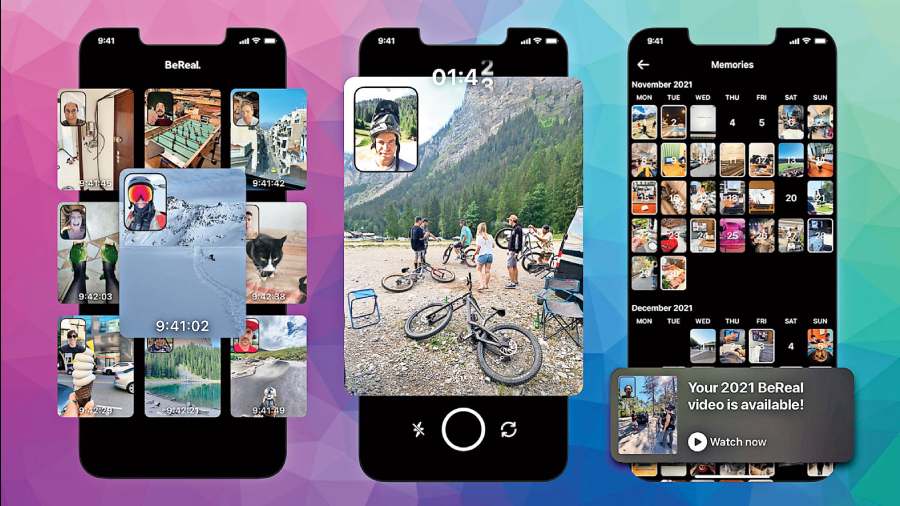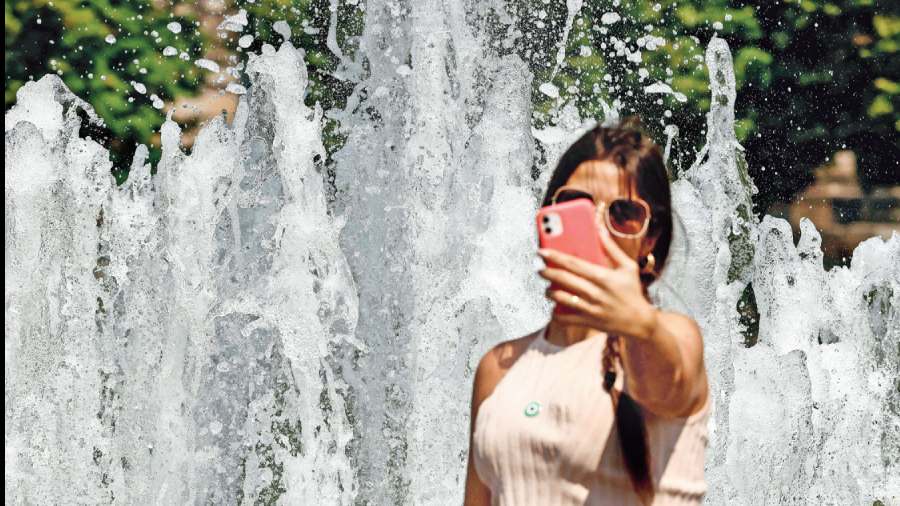We don’t wanna make videos Adam, lol.” The one-liner from actress Chrissy Teigen last week will not be forgotten. She was simply putting across her concern about how Instagram is trying too hard to push videos and become more like TikTok. But Instagram head Adam Mosseri ploughed on about video-focussed features.
Youngsters are switching to TikTok in large numbers wherever it’s available (in India it remains banned) but that’s just one part of the story because there is another app that is presently a hot download — BeReal, which is trying to win Gen Z with authenticity.
Let’s get real
The French social media app, a brainchild of Alexis Barreya, is evolving as Instagram is trying to jump out of a bowl of mush it has created for itself. People really don’t always want to make videos and become creators. They simply want to connect with friends, family members and colleagues. If we all become creators who will watch us? Perhaps a fake version of someone we know.
When Instagram reached a billion users in 2018, Meta (then known as Facebook) chief executive Mark Zuckerberg called it “an amazing success” because of the way it captured the attention of young people. It was around this time, the young brigade was on the lookout for something new, which came in the form of TikTok. Not just the young, even adults are TikTok-ing away. Earlier this month a survey — by Ofcom — of news consumption habits has found that TikTok is the fastest growing news source among adults in the UK. The app is currently being used by seven per cent of UK adults as a news source, compared to one per cent in 2020.
We digress. In recent weeks, the photo-sharing app BeReal soared in popularity to take the number one spot in the US on Apple’s App Store charts, beating TikTok. Not that Instagram is going to succumb but it is beginning to feel the pressure to do something new. The rules on this app are simple — when you make a post, it captures one photo of what’s in front of you and one photo of yourself while taking the photo. The twist? There’s no filter and thus the name of the app.
BeReal is more like an instruction to be yourself before your friends and followers. Ensuring you are caught unadorned, the app sends out an alert at a random time of day, and you have only two minutes to take your snapshots, so you can’t cover the pimple or find that perfect setting.

An overview of the app BeReal
The timing is right
BeReal has been around since 2020 but the last few months have been kind to it. Filters have become overrated and there is a big push against it. Some Android smartphone manufacturers keep coming up with cameras that “beautify” the face to make it free of “blemishes”. Google has been pushing against the trend by ensuring the camera captures the correct tones, which is also a strategy for Apple.
Instagram has slowly become a place where everyone seems to be eating avocado on toast, vacationing all the time and uncorking wine bottles every night. It’s the unreal world that makes reality appear fake. BeReal prioritises randomness, so that users don’t have a chance to rehash a photo from Venice taken five years ago.
The unassuming set of features have worked wonders with market research firm Sensor Tower estimating that the app has been installed 20 million times while another firm, Apptopia, estimates total downloads at 29.5 million. The app that has made the yellow caution emoji — Time to BeReal — popular is winning the popularity game because the aim is not make you another influencer (for which you can join almost any other social media platform) rather it presents you at your creative best. Twitter has done that with the 140-character (now 280 characters) constraint and Vine did it in the past with six-second loops. Here the two-minute countdown is inspiring.
Putting out a picture of a cat and its sleepyhead owner seems mundane but that’s what adults don’t understand. For youngsters, the seemingly mundane can be exciting. People want to connect with people they know and not look at what strangers are up to, which is what is happening on Instagram. After scrolling for a minute or so, strangers and sponsored content pop up.
Should Meta be worried?
Facebook and Instagram are two apps from Meta that are supposed to connect people globally. But these apps have become too big and the eye is obviously on market revenues and satisfying advertisers. Everything was running smoothly — or so it seems — for years but on Wednesday, Meta reported a one per cent decline in quarterly revenue from the previous year or the first time the social media giant’s revenue had fallen since it went public a decade ago. It may not seem like a huge dip but for Mark Zuckerberg it’s enough to start working on minor cracks in the dam. The economy is at the moment turbulent and regulatory scrutiny is ever increasing.
Further, the US Federal Trade Commission is taking Meta to task over a deal to buy a virtual reality company called Within. One has to remember that virtual and augmented reality are central to Zuckerberg’s dream. Compounding his problems is the backlash of celebrities as Instagram pushes more videos. Such has been the backlash that Instagram announced Friday night that it will take a step back from recent changes and it will also reduce the number of recommended posts in the app as it works to improve its algorithms. But that’s for the time being.
To be fair, every other year a new social network surfaces. We have had Mastodon, Peach and Ello. Consider them as pop-up restaurants that create a buzz only to disappear but some of them can leave a lasting impression and turn into something more permanent. BeReal certainly hopes it will be around for a long time. Meanwhile, Meta has done something it keeps doing all the time — Instagram has quietly added a feature to its Reels called Dual, which lets you record with both your front and back camera simultaneously. Isn’t that something similar to BeReal?
For the time being, Meta has problems. And BeReal doesn’t. Success or failure, BeReal is having its moment and has reached a point when it can be considered competition. Wordle made an excellent move by selling itself to The New York Times. What about BeReal? Really.
